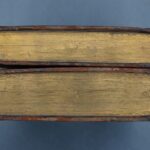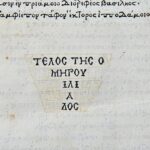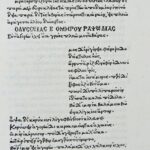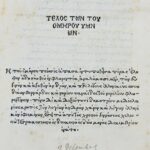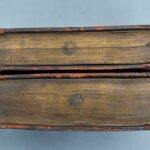In this project Year 12 students selected a book from the Chetham’s library which they then researched, viewed in the library and wrote the following webcasts detailing their experience and findings. This webcast is aimed at younger audiences.
Come and join Chetham’s Sixth Form students in this webcast where they share their knowledge of Homer’s Iliad and the Odyssey. They will be telling us the rumours behind the book, stories and more!
Working on the webcast project has been a truly exciting experience! It was amazing to discover the fascinating books Chetham’s library has on its shelves and the rich history the library and the books hold. I think the highlight of the webcast was being given the opportunity to take a tour around the beautiful library and really getting a feel of how special and rare everything in there is. Working together to record a fun yet informative webcast was a great way to work on leadership and teamwork skills. After a few inevitable bloopers while recording we reached our goal of completing the webcast and we are delighted with the results and we hope that our audience will be too. ~ Y12 student
Webcast transcript:
The Iliad and the Odyssey are by far the two most important stories ever written. These stories are poems called epics and they were written around the 8th century BC. Most people believe that the stories were written by a guy called Homer, a blind storyteller from Ionia in modern day Turkey. However, some people believe the stories are written by many storytellers spreading the story by mouth. The first book The Iliad is set during the Trojan war, a ten-year battle in the city of Troy. It focuses a lot on an argument between King Agamemnon and the mighty warrior Achilles who is needed to win the war. The second book The Odyssey focuses on the end of the war and a ten-year journey back home. The influence of these stories on Western literature has been huge, not only on being a big landmark of Greek culture but inspiring the many famous works of literature, music, art and film later on throughout the whole of Europe. According to the philosopher Plato, Homer was simply the one who taught Greece.
The Iliad is an epic poem by the ancient Greek poet Homer, which recounts some of the significant events of the final weeks of the Trojan War and the Greek siege of the city of Troy. The Iliad is usually considered to be the earliest work in the whole Western literary tradition and one of the best known and loved stories of all time.
The poem consists of twenty-four scrolls, containing 15,693 lines. The main theme of the poem is that of war and peace and the whole poem is essentially a description of war and fighting.
The Odyssey takes place after the Iliad. This Epic is based around the struggle of a Greek warrior Odysseus who has still has not returned to his kingdom in Ithaca 10 years after the Greek victory over the Trojans.
It is a tale of wandering and takes place not on a battlefield but on fantastic islands and foreign lands.
The book is split into around three parts. The first discusses Odysseus’s wife and son and their life in Ithaca in the years that he has been gone. The second half describes what happened in the 8 years after Odysseus left Troy and the final part is about Odysseus returning home. The key theme of the Odyssey is the power of cunning over strength. Like the Iliad the Odyssey begins in medias res, which translates to “in the middle of things”. In other words instead of the story staring from the beginning it starts midway through Odysseus’s wandering.
To give you an insight into the adventures Odysseus has I am going to tell you about his encounter with a Cyclops in book 9.
During the Odyssey Odysseus and his crew encounter a Cyclops which is a giant creature with one eye. The Cyclops traps them in a cave and even eats some of his men. Odysseus came up with a plan to stab the Cyclops in the eye with a piece of timber he found and sharpened. Odysseus proceeds to tell the Cyclops that his name is ‘nobody’ and offers him lots of wine. The Cyclops accepts his wine and drinks lots of it before falling asleep. Odysseus and the remaining men then heated up the handmade weapon on the fire and worked as a team to stab the Cyclops in the eye while he was fast asleep. The Cyclops let out a huge scream and shouted for help from the other Cyclops’ that lived nearby. When they asked if someone was trying to hurt him. He replied ‘nobody!’ As the other cyclops’ thought no one was trying to hurt him they returned back to their caves. To escape the next day Odysseus and his men clung to the bottom of sheep as they left the cave to graze. When the Cyclops found out he has been tricked by Odysseus he gets very angry and prays to his father the God we call Poseidon demanding that Odysseus will never reach home.
Chetham’s library has the first printed edition of Homer and includes The Iliad and The Odyssey. It is the first large-scale printing in Greek, and probably the first Greek book printed in Florence.
The Chetham’s Library copy was bound in Manchester, in around the nineteenth century, by Charles Winstanley, in full calf binding with gold tooling. You can even see this book in real life at the Chetham’s library by booking an appointment.
There are many things inspired from Homer’s Iliad music such as an operetta called Troy by Hoinic. This is the first operetta written in Turkish the operetta’s plot is about the Iliad and the stories surrounding it. There is also an opera by Hector Berlioz called Les Troyens. There are also book and poems written too.
Thank you for listening to our podcast. To find out more about the Iliad and the Odyssey and the other amazing books Chetham’s library has to offer please visit their website here.
Project partners
Project blog
-
No blog posts currently available.
If you have any queries please email us at — joinin@chethams.com
